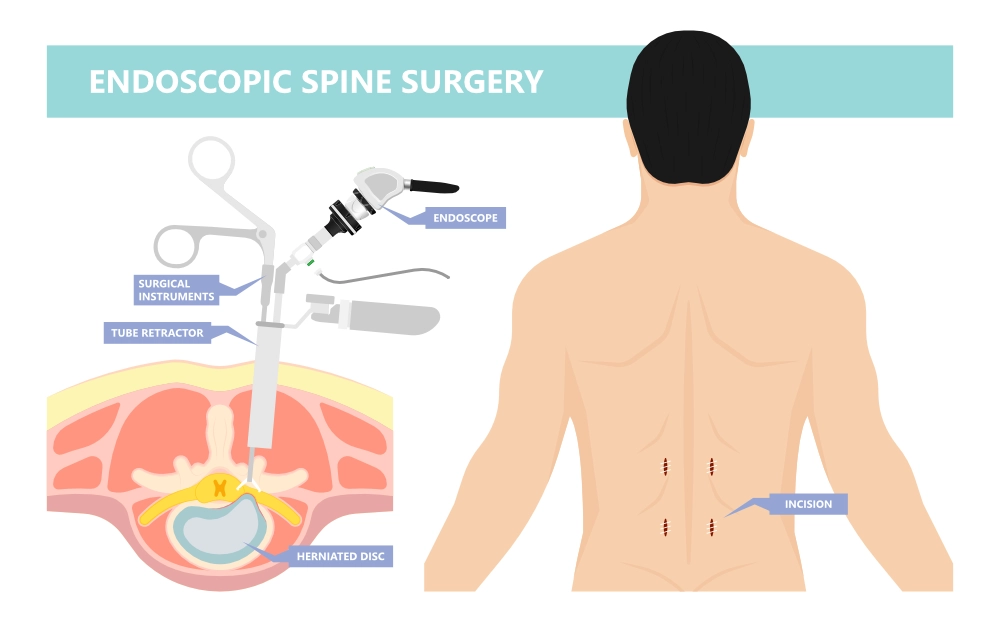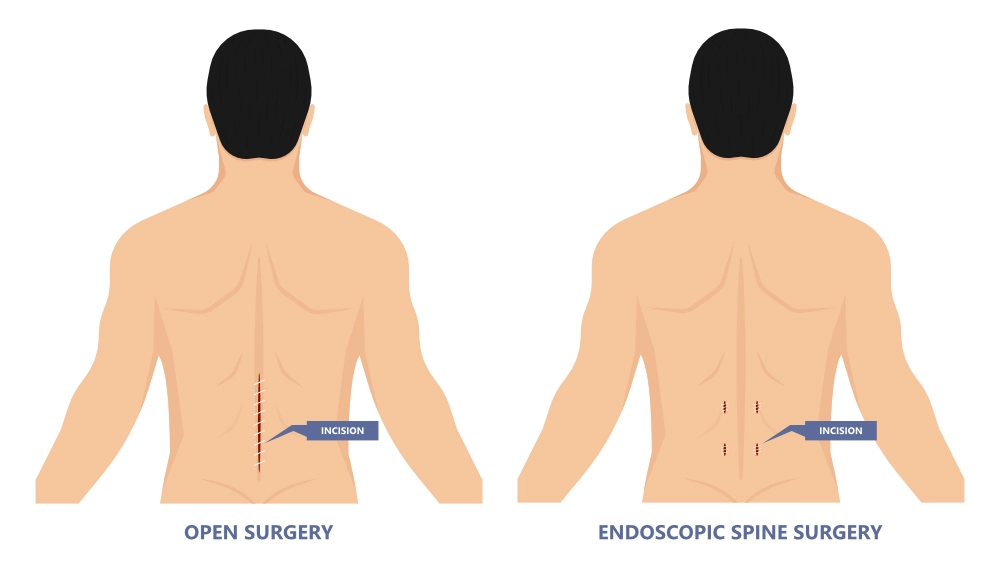At Georgia Spine & Orthopaedics, we are dedicated to providing advanced and minimally invasive solutions for spine-related issues. One of the most innovative and effective treatments we offer is endoscopic surgery. This cutting-edge technique allows us to address various spinal conditions with greater precision, less pain, and faster recovery times compared to traditional open surgery. The benefits of endoscopic spine surgery include shorter procedure times and reduced recovery periods.
Endoscopic techniques are also widely used in other medical fields, such as examining and treating conditions of the digestive system. Endoscopic spine surgery is specifically designed to relieve chronic back and leg pain.
What is Endoscopic Spinal Surgery?
Endoscopic surgery is a minimally invasive surgical technique that utilizes a small tubular instrument called an endoscope.
The endoscope, a flexible tube equipped with a camera and light source, allows the surgeon to visualize the surgical area on a high-definition monitor.
Through a small incision, specialized surgical instruments are inserted alongside the endoscope to perform the procedure, emphasizing its minimally invasive nature.
This minimally invasive procedure uses small tools and camera technology, resulting in smaller incisions, fewer risks, and faster recovery times.
This approach contrasts with traditional open surgery, which typically requires larger incisions, greater tissue disruption, and longer recovery periods. Endoscopic surgery offers numerous benefits, making it an ideal option for many patients suffering from spine-related conditions.
Conditions Treated with Endoscopic Procedures
Endoscopic surgery can effectively treat a wide range of spinal conditions with remarkable precision and minimal invasiveness. Endoscopic surgery is particularly effective for treating disc herniation, offering advantages such as smaller incisions and reduced tissue injury. Some of the key conditions we address at Georgia Spine & Orthopaedics include:
Minimally invasive spinal surgery can also be used to treat problems such as herniated discs, spinal stenosis, and other spinal conditions.
Herniated Discs
When a spinal disc slips out of place or ruptures, it can compress nearby nerves, causing significant pain, numbness, or weakness. Endoscopic spine surgery offers an effective and targeted approach to removing the herniated portion of the disc, relieving pressure on the affected nerves.
This minimally invasive method not only alleviates pain but also promotes faster recovery with less postoperative discomfort compared to traditional open surgery.
Spinal Stenosis
This condition involves the narrowing of the spinal canal, which can lead to severe pain, numbness, and weakness in the legs and back. Endoscopic decompression surgery can precisely target and remove excess tissue, bone spurs, or ligaments that are causing the narrowing, thereby restoring adequate space for the spinal nerves and improving mobility and quality of life.
Degenerative Disc Disease
As the spinal discs age and deteriorate, they can contribute to chronic back pain and reduced spinal flexibility. Endoscopic techniques allow for the removal of damaged disc material and the implementation of stabilizing treatments. By addressing the degenerated discs with minimal disruption, this approach helps to restore spinal function and alleviate associated pain.
Sciatica
Sciatica is characterized by intense leg pain radiating down the leg due to compression or irritation of the sciatic nerve. Endoscopic spine surgery can effectively treat both back and leg pain by addressing the underlying causes of sciatica, such as herniated discs or bone spurs, through a minimally invasive procedure.
This targeted intervention helps relieve pain and improve leg function with a quicker recovery time.
Spondylolisthesis
This condition occurs when one vertebra slips over another, potentially causing back pain and nerve compression. Endoscopic surgery can assist in stabilizing the affected vertebrae and alleviating symptoms by using advanced techniques to restore alignment and reduce the strain on surrounding structures.
Spinal Infections and Tumors
For patients with spinal infections or tumors, endoscopic techniques can be used for diagnostic biopsy and, in certain cases, for the removal of abnormal growths or infected tissue. The minimally invasive nature of this procedure helps to reduce the impact on surrounding tissues and speeds up the recovery process.
Facet Joint Disorders
Facet joints, which help stabilize the spine, can become inflamed or degenerated, leading to localized pain and stiffness. Endoscopic procedures can provide relief by targeting the affected facet joints and performing precise decompression or ablation techniques.
Foraminal Stenosis
This condition involves the narrowing of the openings (foramina) through which spinal nerves exit the spinal canal. Endoscopic surgery can effectively relieve nerve compression by removing excess bone or tissue, thereby alleviating symptoms like radiculopathy (pain radiating into the arms or legs).
By utilizing endoscopic surgery, our skilled surgeons at Georgia Spine & Orthopaedics offer patients a less invasive option for treating various spinal conditions. This approach not only improves surgical outcomes but also supports a faster return to daily activities and a higher quality of life.
Benefits of Minimally Invasive Spine Surgery
Choosing endoscopic surgery and other endoscopic procedures at Georgia Spine & Orthopaedics offers several significant advantages:
Minimally Invasive: Smaller incisions mean less tissue damage, reduced scarring, and decreased risk of infection. This also translates to less disruption of muscles and other soft tissues, preserving the natural structure and function of the spine. Minimally invasive spine surgery, including endoscopic techniques, helps in preserving spinal anatomy and facilitating faster recovery times. However, it is important to remember that endoscopic surgery is still a medical procedure with its own set of risks and benefits.
Quicker Recovery: Patients typically experience faster recovery times and can return to normal activities sooner compared to traditional open surgery. This is particularly beneficial for individuals who lead active lifestyles or have responsibilities that require them to be back on their feet quickly. Additionally, a shorter recovery period means less time off work and fewer days spent in discomfort.
Less Pain: The minimally invasive nature of endoscopic surgery generally results in less postoperative pain and reduced need for pain medication. This reduction in pain not only enhances the overall patient experience but also lowers the likelihood of dependence on painkillers, which can be a concern with more invasive procedures.
Improved Precision: The high-definition visualization provided by the endoscope allows for more precise surgical interventions, enhancing overall outcomes. Surgeons can clearly see the affected area in great detail, which helps in accurately targeting the problem and minimizing the impact on surrounding healthy tissues.
Reduced Hospital Stay: Many endoscopic surgeries are performed on an outpatient basis, allowing patients to go home the same day. This convenience reduces hospital costs and the potential for hospital-acquired infections. Patients can recuperate in the comfort of their own homes, which can further aid in a speedy recovery.
Lower Risk of Complications: With smaller incisions and less disruption to surrounding tissues, the risk of complications such as infection and blood loss is significantly reduced. This not only ensures a safer procedure but also contributes to a smoother and more predictable healing process.
Enhanced Mobility and Functionality: Because endoscopic surgery is less invasive, patients often experience less stiffness and a quicker return to normal spinal mobility. This is crucial for maintaining an active lifestyle and preventing long-term issues that can arise from more invasive surgical methods.
At Georgia Spine & Orthopaedics, we are committed to utilizing the most advanced techniques to ensure our patients receive the best possible care. Our expertise in endoscopic surgery enables us to provide effective treatment with minimal disruption to your life.
Our Expertise at Georgia Spine & Orthopaedics
At Georgia Spine & Orthopaedics, our team of highly skilled surgeons is experienced in performing endoscopic spine surgeries. We are committed to staying at the forefront of medical advancements and continuously improving our techniques to provide the best possible care for our patients.
Our surgeons are board-certified and fellowship-trained in spine surgery, ensuring that they possess the expertise necessary to handle even the most complex cases. We utilize state-of-the-art technology and the latest surgical techniques to deliver optimal outcomes for our patients.
The Endoscopic Surgery Process
Understanding what to expect during the endoscopy procedure can help alleviate any concerns and ensure a smoother experience. Our spine specialists provide accurate diagnoses and tailored treatment plans to address your specific needs. Here is a step-by-step overview of the typical endoscopic surgery process at Georgia Spine & Orthopaedics:
Our experienced spine surgeons perform advanced techniques like endoscopic spine surgery to relieve pain and improve patient outcomes.
1. Consultation and Diagnosis
The journey begins with a thorough consultation and diagnostic evaluation. Our surgeons will review your medical history, perform a physical examination, and order any necessary imaging studies such as X-rays, MRI, or CT scans.
Based on the findings, we will determine if endoscopic surgery is the appropriate treatment option for your condition.
2. Preoperative Preparation and General Anesthesia
Once endoscopic surgery is recommended, our team will provide detailed preoperative instructions. This may include guidelines on medication use, fasting, and other preparations to ensure a successful surgery.
3. Endoscopic Surgical Procedure
On the day of the surgery, you will be admitted to our state-of-the-art surgical facility. The procedure is typically performed under local anesthesia with sedation, although general anesthesia may be used in some cases.
Upper endoscopy is a common procedure used to examine the upper digestive system, including the esophagus, stomach, and duodenum.
Small incisions are made, and the endoscope and surgical instruments are carefully inserted. The surgeon will use the endoscope to visualize the surgical area and perform the necessary interventions. The procedure typically takes one to two hours, depending on the complexity of the case.
4. Postoperative Care
After the surgery, you will be monitored in the recovery area for a short period. Most patients can go home the same day, although some may require an overnight stay for observation. Patients may experience a mild sore throat as a result of the endoscopy, particularly if the scope is inserted through the throat. Our team will provide detailed postoperative care instructions, including guidelines on activity restrictions, wound care, and follow-up appointments.
5. Recovery and Rehabilitation
The recovery period for endoscopic surgery is generally shorter compared to traditional open surgery. Patients can expect to resume light activities within a few days to a week, with a gradual return to normal activities over several weeks.
Physical therapy may be recommended to aid in the recovery process and improve strength and mobility.
Schedule a Consultation
If you are suffering from a spine-related condition and are considering endoscopic surgery, we invite you to schedule a consultation with our experienced team at Georgia Spine & Orthopaedics.
Our goal is to provide you with personalized, compassionate care and help you achieve a pain-free, active lifestyle.
To schedule an appointment or learn more about our endoscopic surgery services, please contact us at 678-929-4494. We look forward to helping you on your journey to better spinal health.








